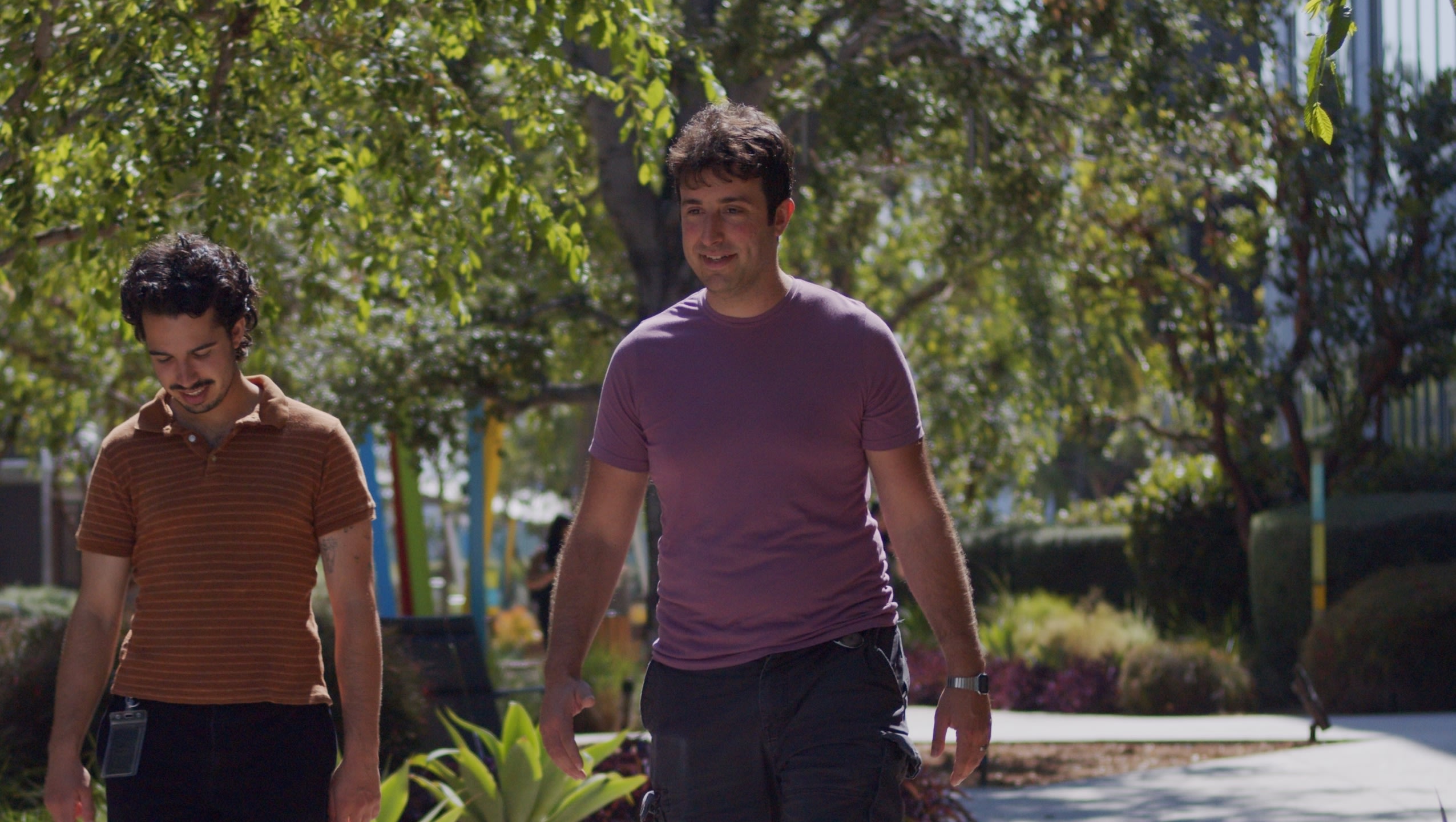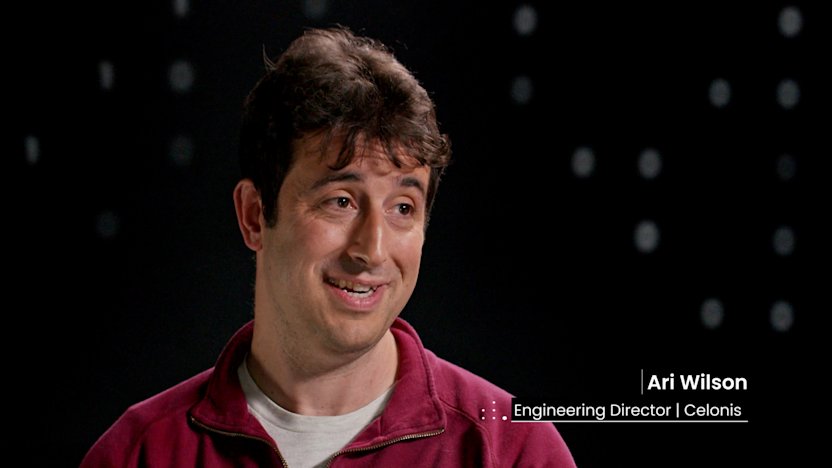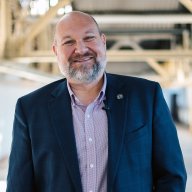
Engineering leadership: A server crash taught me this one critical lesson
If you haven’t broken anything, you aren’t working hard enough. It’s the tough lessons, the seemingly insurmountable challenges, that teach us the most, says Ari Wilson, Engineering Director as Celonis. He and the engineering leadership at Celonis are building an environment where developers are supported, encouraged to step outside their comfort zone and always learning.
Wilson has degrees in Computer Science from Vanderbilt University. Prior to joining Celonis, Wilson held multiple engineering and leadership roles at Google and was co-product lead for planning YouTube ads.
I talked with Wilson while visiting the Celonis Los Angeles office, located in Silicon Beach. He shared with me why he became a software engineer, how he and the Celonis team are building software that delivers business sights to every type of user, and his advice for new engineering leaders.

The following is a transcript of the interview edited for readability.
My first program: Calculator messaging app
Bill Detwiler: What made you want to become a software engineer?
Ari Wilson: Well, it was when I was pretty young, actually. I saw, I think it was seventh grade, I saw “Triumph of the Nerds,” the documentary on PBS, Bill Gates, Steve Jobs, sort of real life thing and I realized, hey, these are kind of my people, they're nerdy and they're getting things done and then they're using computers to do this. What are these computers doing? They're just like executing one thing at a time and always doing the same thing over and over again and you can really just get a lot done that way. It's pretty amazing actually.
Bill Detwiler: Do you remember that first line of code you ever wrote?
Ari Wilson: I do actually. So I was in seventh grade and I was on the school bus with my friend and we had this problem where we were on adjacent school buses at the time we didn't have phones or anything so we wanted to communicate with each other, but we did have these graphing calculators and you could use those to display a message really big, like zoom in on a piece of text and like really display that message really big and so we could communicate with each other, so that was a cool little... My first program.
Bill Detwiler: That is so cool. So, although I'm sure the work you're doing now is a little more complicated than that.
Ari Wilson: A little. A little.
Bringing Celonis EMS to everyone
Bill Detwiler: Tell me about some of those really interesting projects that you're working on right now.
Ari Wilson: Sure. We're trying to improve the way that people talk and deal with processes at their companies and increase their efficiency and then we're trying to bring the best of Celonis to everybody at these companies. Right now, it's sort of limited in scope to certain users and certain other folks and we want to bring it to everyone. That's our goal.
Bill Detwiler: And what do you like best, or maybe what do you, if not best and what do you just like about that type of work?
Ari Wilson: I think it's a couple of things, actually. I think there's sort of a big data element to it where you're looking at customers' data and trying to figure out sort of are there patterns that we can reuse to sort of help them answer their questions. There's also working closely with product and UX to sort of figure out what the best experience is for users who are not necessarily technical, who don't understand all the nitty gritty of the data and sort of figure out how we can present it in a way that really is actionable and useful for them in sort of a beautiful experience.
Bill Detwiler: What are some of the tough engineering, technical challenges that are also exciting that you're working on right now?
Ari Wilson: Sure. So I alluded to it a little bit before, but I think one of our biggest technical challenges with the new projects that we're working on is figuring out how to represent customer data in a sort of more general way, get a semantic understanding of customer data by looking at it at large scale, looking at it by examples and sort of building an inference engine that's able to understand that and answer customers, questions that they might have.
Vacation + server failure = learning experience
Bill Detwiler: And how have your past experiences helped prepare you to tackle that challenge?
Ari Wilson: Well, this is interesting, because I kind of have past experience in all of these areas of the data side. There's also a front end component to this, how do we display it? On the data side, I'll just mention, at my previous company, we worked with very large data and for six, seven, eight, nine years, long time and there was just so many ways that you could make assumptions about things being uniform that were actually not uniform and would result in things blowing up so I think one fun story is I went to Big Bear for a weekend and I was on call and I happened to get-
Bill Detwiler: A bold move by the way.
Ari Wilson: ... a page. Yes, yes.
Bill Detwiler: I've been on call and IT myself.
Ari Wilson: It was a bold play-
Bill Detwiler: Props, props for going on vacation, being on call.
Ari Wilson: It was a bold play that didn't pay out for me that well in this instance, unfortunately, otherwise there would be no story, but I was in Big Bear on call at around midnight, of course. The pager goes off. I go look at what's going on. All the normal metrics look good, everything looks good, just the system is blown up, we're out of RAM and things are crashing and what I realized is, and this took me several hours so shortening that a bit, was that we had assumed some things that were constants in the formula that we were calculating, weren't constants and it turned out instead of being one or two variations of them, there was actually 10 billion variations of them.

Bill Detwiler: Oh. Yeah.
Ari Wilson: And so we kind of exploded our memory to store all those different variations so I'm hoping to learn some lessons from that for Celonis…
Bill Detwiler: Yeah, it's sometimes you learn more, I think, from those hard lessons, right? Or those points of failure, it's what you take away from them that give you the most experience.
Ari Wilson: I tell people that they haven't been working hard enough if they haven't broken anything recently. And yeah, we give people a hard time about things like taking down the servers or whatever, but it's all in fun and it's a way that's how you learn that really these tough lessons about how actually systems operate.
Engineering a team where people are challenged and learning
Bill Detwiler: So tell me a little bit about how the team works together to tackle tough challenges?
Ari Wilson: So there's sort of two sides to this. I think first of all, like locally, within LA, we're building a great team here to take on these challenges and the other leaders that I work with now, we've had to combine 50 plus years of experience working together and there it's just a matter of trust and intuition and we sort of know when people have a problem with what's being said or what's going on, or they want to take things a different way.
If you're in a role where you're not challenged, not learning, not taking on tough challenges, you need to find a better role…
Ari Wilson: We have a very good understanding of how to work, operate effectively together and we're going to bring that to anyone who comes in our door and mentor them and bring them up into that environment and then they're sort of working remotely with folks in Celonis Europe, and there we're working with the world's experts on process mining and execution management and it really is inspiring to work with people like Professor Wil who's one of the world renowned experts in process mining and have him give us insight into how new users to process mining might perceive the whole experience and then working with other teams in Europe as well, just figuring out, making sure that we synchronize our times. We all both want to have our summits while the sun is out, which is hard to arrange between Munich and the US but we make it happen.
Celonis Excellence in Engineering: Celonis engineering excellence in LA’s Silicon Beach | Excellence in Engineering Leadership: The best piece of advice I was ever given | Engineering an environment where software developers grow, thrive and make a difference | Software engineering secrets: Celonis tech leaders share advice for managing and motivating developer teams | Engineering an operating system for the enterprise, business software that’s everywhere
Bill Detwiler: Yeah. So as someone who's both a software engineer and an engineering leader, what piece of advice would you give to new engineers for how they should approach tough technical challenges?
Ari Wilson: So two things. One is, I think you should always be willing to step outside your comfort zone. That's how I've always approached my career. To give some examples, I was asked to, well, I wasn't asked to, I actually came up with this, was we had an important priority feature. The product team was undergoing transition and there was nobody else left to do it but I took on the challenge of writing a requirements document for that feature, went and talked to customers, went and talked to sales, figured it out. Well, I'm not a product manager, but somebody has to figure this stuff out and that was a growing experience for me and contributed to some of my later contributions on the product side.
Ari Wilson: The other thing I'd say is just always be learning. If you're in a role where you're not challenged, not learning, not always taking on these tough challenges, you need to find a better role for yourself and advocate for yourself in that regards and that's how I've tried to work with folks that I, work with folks.
Join the Celonis team in LA or around the world
At Celonis we’re building a new type of enterprise technology, called execution management. And, we’re recruiting the world’s best engineers to do it. Whether you’re a frontend or backend developer, full stack engineer, data scientist, DevOps specialist, QA analyst or engineering leader – we have technical challenges that need solving.
To learn more about how we’re pioneering advances in AI, machine learning, automation, analytics and data mining, and to see current engineering job openings, visit Celonis Engineering.



